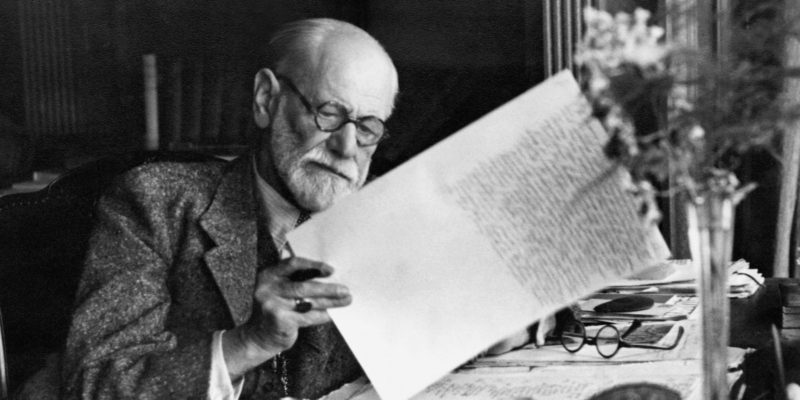We explain who Sigmund Freud was and the topics that covered his studies. Also, what are its characteristics and recognized works?
Who was Sigmund Freud?
Sigmund Freud was an Austrian psychiatrist who investigated the structure and behavior of the mind, as well as the pathologies associated with it. His main contribution to human knowledge was the creation of psychoanalysis. This discipline is both a research method and a therapeutic technique.His theory was based on the study of patients, and his cases have been published, supporting his theories. His works and discoveries were published at the end of the 19th century, revolutionizing the thinking of the 20th century, due to its main innovations :
- The possibility of treating mental disorders with an alternative therapy to drugs: psychoanalysis
- The discovery of a sector of thought alien to our own knowledge: the unconscious.
Next, and as a summary of Freud's theory, we present the most important characteristics.
Sigmund Freud Characteristics :
Biography

From a very young age, Freud demonstrated his intelligence and curiosity, being able to read in German, French, Italian, Spanish, English, Hebrew, Latin, and Greek. After studying law, philosophy, and zoology outside of the university, he graduated as a doctor in 1881. He devoted himself to dermatology and psychiatry. He married Martha Bernays in 1886, with whom he had six children: Mathilde, Jean-Martin, Oliver, Ernst, Sophie, and Anna.
In Paris, together with Jean-Martin Charcot, he studied the use of hypnosis in the treatment of mental disorders. The concepts of psychoanalysis were developed mainly between 1895 and 1900, but his research continued throughout his life. He died on September 23, 1939, in London.
Psychoanalysis
Psychoanalysis has a double nature: on the one hand, it is a research method and on the other hand it is a therapeutic practice. Both aspects of psychoanalysis affect each other.Both the practice and the research are based on the same descriptive and explanatory theoretical model about the phenomena of the mental life of the human being. Psychoanalysis is one form of psychology, but not the only one.
The unconscious
 Freud's greatest discovery is likely to have been the existence of unconscious contents in the human mind. The unconscious is all the contents that are not accessible to consciousness and that are nevertheless part of thought.
Freud's greatest discovery is likely to have been the existence of unconscious contents in the human mind. The unconscious is all the contents that are not accessible to consciousness and that are nevertheless part of thought.The unconscious is organized in the thought system, alien to the structure of the word. That is to say that in the unconscious, the concepts are not separated from each other but close thoughts can merge and be confused.
We only have access to the contents of the unconscious when they become preconscious, in the form of dreams, fantasy, and art. The unconscious affects our entire conscious life, from our musical preferences to our choice of partner.
Psychoanalytic techniques consist in making the unconscious conscious to avoid the psychic suffering of mental illnesses.
Repression
Repression is the process by which the mind converts an event (a fact, person, or emotion ) into unconscious content. This is an involuntary defense mechanism that we perform when encountering something that becomes intolerable.However, no content can be totally successfully repressed, but what are repressed returns, manifesting itself in the form of jokes, dreams, or cultural productions, or, in the worst cases, causing psychic pathologies (such as hysteria, compulsion, hypochondria, etc.). When psychic pathologies appear, psychoanalysis maintains that the most effective way to cure them is to make the repressed contents conscious.
Oedipus complex
 Freud discovered that the male child wants to seduce his mother, creating a conflict with the father. The father represents the law, which prevents union with the mother. Freud discovered that the taboo (prohibition) of incest is common to all known cultures. The Oedipus Complex is the stage through which the infant passes in which he accepts the paternal prohibition and stops looking for the mother.
Freud discovered that the male child wants to seduce his mother, creating a conflict with the father. The father represents the law, which prevents union with the mother. Freud discovered that the taboo (prohibition) of incest is common to all known cultures. The Oedipus Complex is the stage through which the infant passes in which he accepts the paternal prohibition and stops looking for the mother.This process is housed in the unconscious, leaving marks that determine the choice of future partners. The name of this process was taken by Freud from the myth of Oedipus, an adopted Greek prince who unknowingly murders his biological father and marries his biological mother.
The interpretation of dreams
Freud discovered that dreams transmit unconscious contents, making them preconscious. Dreams can clearly represent a desire, only when consciousness can accept the existence of that desire. However, if the desire has been repressed, it appears hidden, that is, an interpretation is necessary.
The pleasure principle
 The psychoanalytic theory maintains that the psyche always seeks to achieve pleasure and avoid displeasure. In other words, the main motivating force for the functioning of the unconscious is a pleasure. That is why thoughts that produce excessive pain are repressed. However, the conscious mind does not operate under the pleasure principle, but under the reality principle, which is its opposite: the need to adapt to one's environment. For this reason, what is repressed manifests itself again in the form of a symptom.
The psychoanalytic theory maintains that the psyche always seeks to achieve pleasure and avoid displeasure. In other words, the main motivating force for the functioning of the unconscious is a pleasure. That is why thoughts that produce excessive pain are repressed. However, the conscious mind does not operate under the pleasure principle, but under the reality principle, which is its opposite: the need to adapt to one's environment. For this reason, what is repressed manifests itself again in the form of a symptom.
Structures of the mind
The different workings of the mind can be grouped into three structures:
- It. They are the primal impulses and the motor of our behavior. Here is the pleasure principle.
- Superego. It represents the law, the limits, the principles. It is built thanks to the passage through the Oedipus Complex.
- Me. It acts by responding to both the Id and the Superego.
Books
 Some of his most important works are:
Some of his most important works are:
- Studies on Hysteria 1895
- The Interpretation of Dreams 1898
- Psychopathology of Everyday Life 1900
- The joke and its relationship with the unconscious 1905
- Three Essays for a Sex Theory 1905
- Totem and taboo 1905
Quotes
- I have been a lucky man: nothing in life has come easy for me.
- The good guys are content with dreaming what the bad guys make come true.
- It is a good exercise to be completely honest with yourself.
- Anyone awake who behaved as he does in dreams would be taken for a madman.
- I cannot think of any need in childhood as strong as the need for protection.
- This is absurd! (last words before dying).
MA student of the TransAtlantic Masters program at UNC-Chapel Hill. Political Science with a focus on European Studies. Expressed ideas are open to revision. He not only covers Technical articles but also has skills in the fields of SEO, graphics, web development and coding. .
Leave a reply
Your email address will not be published. Required fields are marked *Recent post

Sport: What Is It, Types, Risks, Features, Characteristics and Examples
September 23, 2021

Dogs: Emergence, Features, Characteristics, Feeding and Breeds
September 24, 2021

Story: Definition, Elements, Structure, Features and Characteristics
September 24, 2021

Essay: Definition, Structure, Features, Characteristics, How to Do It
September 24, 2021
